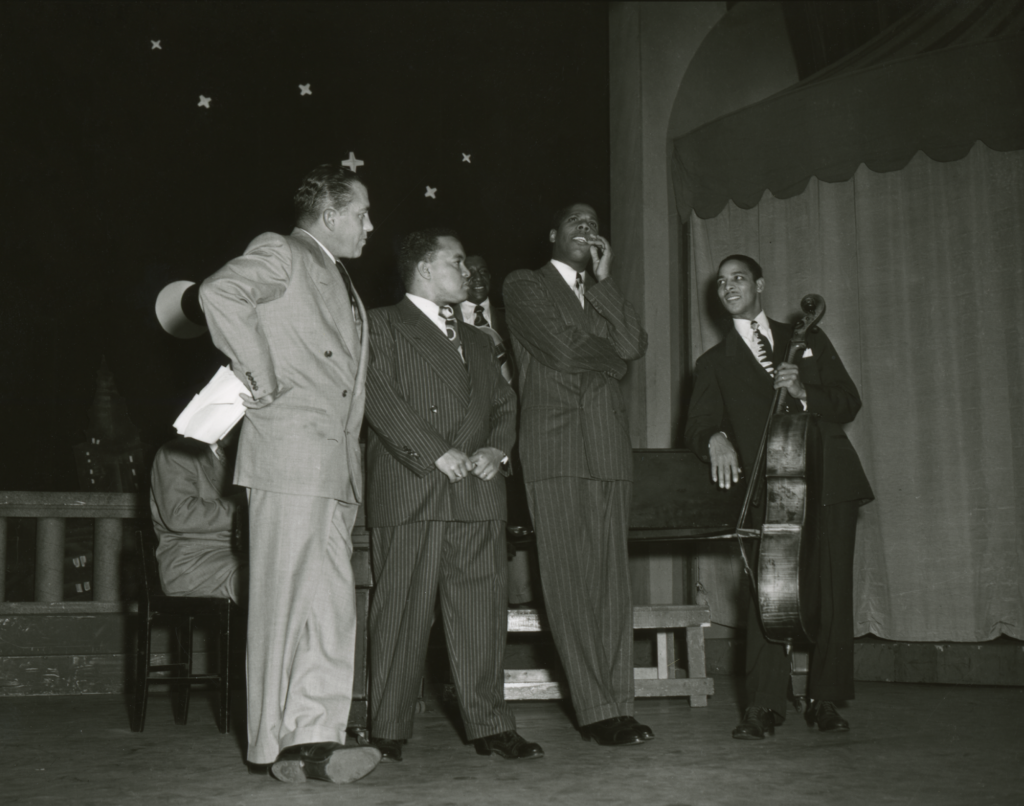
This Black Music Month, we begin by acknowledging the profound impact of black music not only within American culture but globally. Music created by Black Americans remains some of the most popular and influential sounds in the world, shaping various genres and subgenres throughout history. One of the pioneering acts, that is often overlooked, but exemplified this influence was a group known as The Ink Spots. Renowned for their harmonious melodies, mellow guitar riffs, and distinctive talking bass, The Ink Spots were one of the first musical acts to cross racial barriers within the American music scene. Their groundbreaking achievements include gaining crossover success, and making history as the first black performers to appear on national television. This significant moment occurred on none other than The Ed Sullivan Show, which was then famously known as “Toast of the Town.” Let’s delve into the history of this influential group and their impact on music today.
Formed in the early 1930s, The Ink Spots originated in Indianapolis, Indiana, with members Orville “Hoppy” Jones, Ivory “Deek” Watson, Jerry Daniels, and Charlie Fuqua. However, it wasn’t until Bill Kenny joined the group in 1936 that their sound truly took shape. Kenny’s songwriting system, known as the “Top and Bottom System,” was a new innovative way to write songs. The “Top and Bottom System,” worked by having the tenor sing the whole song throughout, finishing with the bass ad-libbing or speaking words not a part of the song. This new form of song structure in combination with Kenny’s ballad-style singing, and Jones’ distinctive bass voice, brought in a new musical era that garnered never-seen acceptance in both white and black communities. Although, the group’s music predated rhythm and blues, rock and roll, and doo-wop they significantly influenced these genres with their unique songwriting system and mellow guitar riffs.
This impact would continue as The Ink Spots made television history on November 6th, 1936 during the first live TV demonstration at NBC. The demonstration which was broadcast from the transmitter on top of the Empire State Building and was received on the 62nd floor of the RCA building was the first live television program. As featured artists during this demonstration, The Ink Spots became among the first people to be televised. However, this demonstration was solely for the press and wouldn’t be seen by the mass public. It wasn’t until over a decade later, when American households could tune into their new television sets that The Ink Spots would break history again.
On June 27th, 1948, on Ed Sullivan’s “Toast of the Town,” The Ink Spots would again make television history, this time as the first black performers to appear on live national television. Invited by Ed Sullivan himself, The Ink Spots showcased their talents and set a precedent for future African-American artists. At a time when television was still in its infancy, their presence as black artists on a popular variety show unknowingly broke down racial barriers and challenged the status quo. As a result, changing Ed Sullivan’s stage forever; to the symbol of inclusion it is today. That night The Ink Spots and Ed Sullivan showcased to America the power of music and its transformative ability to bring people together.
The Ink Spots’ influence can be seen across multiple genres and generations of musicians. Artists like The Temptations, The Drifters, and even modern-day bands owe a debt of gratitude to The Ink Spots for their contributions to music. Their songs are still featured today in media outlets like the popular game “Fallout” and shows like “The Walking Dead” and “Better Call Saul.” Through their success with chart-topping hits like, “If I Didn’t Care” and “Java Jive,” The Ink Spots proved early on that black musicians are capable of commercial success. Ultimately, opening the doors for generations of artists who’ve come after them. Their popularity even led to countless imposter groups. It is said that at one point 40 groups existed, all claiming to be The Ink Spots. Their lasting impact on music and American culture is undeniable, yet somewhat unknown. So during this Black Music Month let us honor one of the pioneers in not just black music but American music: The Ink Spots.
For more Ink Spots performances be sure to subscribe to our YouTube channel!
